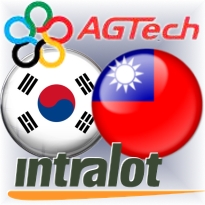 A group led by Greek lottery outfit Intralot has won the 10-year contract to run the Taiwan Sports Lottery. On Wednesday, the Taipei Times reported that the Sports Affairs Council had selected Intralot and its partners – Taipei-listed digital memory manufacturer ADATA Technology and the Chinatrust Commerical Bank – to commence their role as sports lottery ticket vendors beginning Jan. 1, 2014. The current sports lottery operator, Fubon Bank subsidiary Taiwan Sports Lottery Corp., opted not to seek renewal of its license after repeatedly failing to make the required remittance to the government, for which the company blamed government-mandated payout percentages and restrictions that limit the lottery to 10-game parlays.
A group led by Greek lottery outfit Intralot has won the 10-year contract to run the Taiwan Sports Lottery. On Wednesday, the Taipei Times reported that the Sports Affairs Council had selected Intralot and its partners – Taipei-listed digital memory manufacturer ADATA Technology and the Chinatrust Commerical Bank – to commence their role as sports lottery ticket vendors beginning Jan. 1, 2014. The current sports lottery operator, Fubon Bank subsidiary Taiwan Sports Lottery Corp., opted not to seek renewal of its license after repeatedly failing to make the required remittance to the government, for which the company blamed government-mandated payout percentages and restrictions that limit the lottery to 10-game parlays.
Intralot’s Asia-Pacific operations director Dmimitrios Markakis told GamblingCompliance the contract represented “a very big opportunity” for the company, which is making its first stab at running an Asian sports lottery project. But best keep the champagne on ice for the moment, because the losing bidder – a partnership between ICP Electronics, Taishin International Bank and Lottomatica subsidiary GTech – issued a statement saying it intends to appeal the decision. ICP categorized the Sports Affairs Council’s vetting process as “truly crude” and “opaque,” and thus the company “cannot accept the decision.” Obviously, they haven’t got past the denial, anger, bargaining and depression stages of grief that precede acceptance.
Hong Kong-based sports lottery provider AGTech Holdings Ltd. has just inked a deal to provide 530 C8 betting terminals to South African horseracing/tote betting operator Gold Circle Ltd. The deal was made via AGT subisidary Beijing AGTech GOT Technology Co. Ltd. and represents China’s first international lottery hardware sale. AGTech CEO John Sun said the deal “marks a significant milestone” in the company’s history that validates their 2011 acquisition of GOT, which supplies over half the technology underpinning the Chinese sports lottery market. Xinhua reported that Chinese sports lottery sales rose 12.8% in November to RMB 10.84b (US $1.74b), while welfare lottery sales rose 8.5% to RMB 12.87b. Total year-to-date sales are up 17.9% to RMB 234.72b ($37.65b).
Lotteries are also on the rise in South Korea, but the government mandates a KRW 2.875 trillion (US $2.675b) cap on lottery revenue, both to keep a lid on citizens’ spending and to avoid being accused of preying on vulnerable members of Korean society. (The government also bars locals from all but one of South Korea’s 17 casinos and aims to keep total gambling business revenue to 0.58% of the country’s GDP.) But lottery sales rose over 20% last year, resulting in total lottery revenue of KRW 3.08t.
Sales have grown by a more modest 4.1% this year, but the Yonhap news agency reports that the revenue cap had already been breached by the end of November, and expectations are that the final figure for 2012 will come in at KRW 3.2t. The Korea Lottery Commission (KLC) has requested this year’s cap be lifted, an option within the control of the National Gambling Control Commission (NGCC), but the request was refused based on the “need for sound management” of the lottery sector. Not for nothing, but breaching the cap means the KLC is required to pay financial penalties to the NGCC, meaning the NGCC has a vested interest in sticking to its guns.